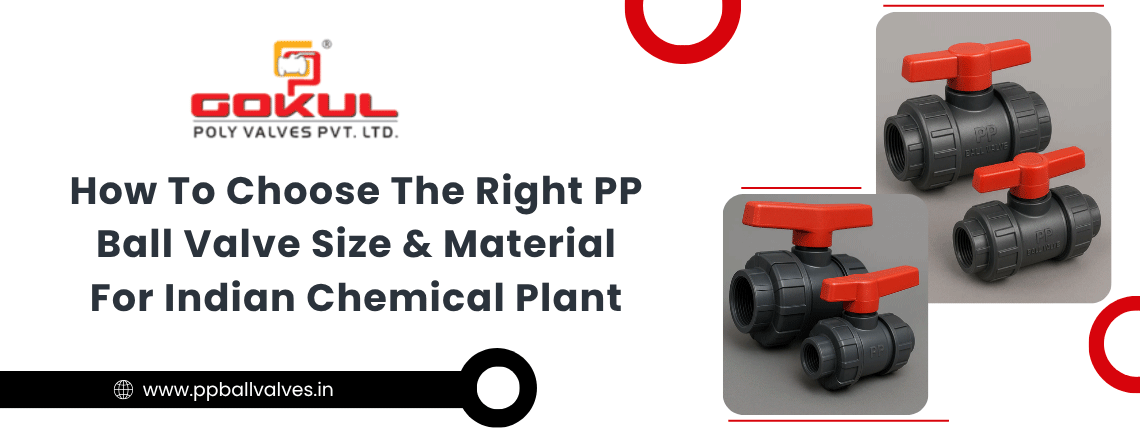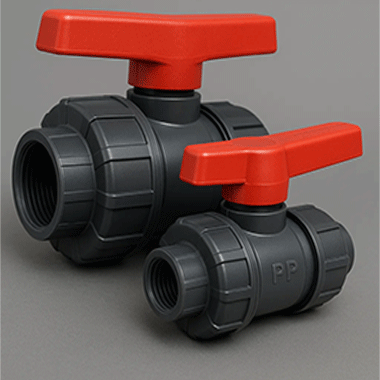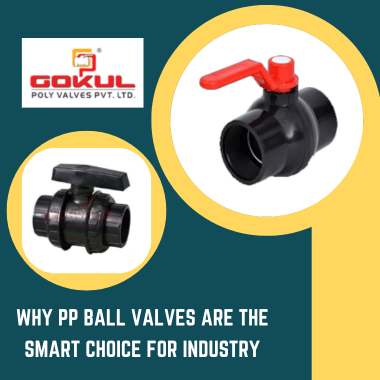1.Introduction: Why Valve Selection Matters
At Gokul Poly Valves, we havve worked with hundreds of chemical plants across India - and one thing we have noticed over the years is that many performance or leakage issues do not come from the pipeline itself, but from the wrong choice of valve.
Chemical plants operate under extreme conditions - high pressure, temperature changes and exposure to corrosive chemicals. Choosing the wrong size or material can cause leakage, damage or even system failure.
That is exactly why this topic matters. If you run or manage a chemical plant, knowing how to select the right PP Ball Valve can save you both money and downtime. And since we have been in this industry for more than two decades. It is the right time to share what we have learned from our own work and customer experiences.
2.What Exactly Is a PP Ball Valve?
A PP (Polypropylene) Ball Valve is a flow control device that uses a spherical ball with a hole through its centre to regulate fluid movement. When the handle is turned 90°, the flow either starts or stops - simple, efficient and reliable.
Unlike metal valves, PP Ball Valves don’t rust, react with chemicals, or corrode over time. That’s what makes them perfect for chemical, water treatment, and effluent systems.
At our Ahmedabad facility, we’ve engineered PP Ball Valves specifically for Indian operating conditions - they handle everything from acidic effluents to industrial solvents without complaint.
3.Why Polypropylene Is the Ideal Material for Chemical Plant
We often get asked, “Why PP? Why not metal or PVC?”
Here’s what we have learned after testing multiple materials in our in-house lab and at client sites:
- Chemical resistance:Polypropylene is one of the most chemically stable plastics. It resists acids, alkalis and solvents that would easily corrode metal.
- Lightweight:A PP Ball Valve weighs almost 60% less than a brass or metal valve, making installation much easier.
- Cost-effective: Lower raw material cost and longer service life mean better ROI.
- Non-reactive: PP doesn’t react with most process fluids — ideal for chemical plants dealing with aggressive media.
- Easy maintenance:No rust, no scaling and very little upkeep required.
We have seen valves last 7–10 years in certain installations with minimal maintenance - something even stainless steel struggles to match when exposed to chemicals.
4.Key Factors to Consider Before Choosing a PP Ball Valve
When clients reach out to us, we don’t just hand them a catalogue. We ask questions - because the right valve depends on your process conditions.
a. Operating Pressure and Temperature
Every PP Ball Valve has a rated pressure (usually up to 10 bar) and temperature limit. Going beyond this can deform the plastic. Always match the valve’s rating to your system’s working conditions.
b. Fluid Type
Is it acidic, alkaline, or neutral? Does it contain suspended particles? Polypropylene is great for most chemicals, but if you’re handling solvents like toluene or xylene, you might need a specialized polymer mix.
c. Connection Type
Choose between threaded, flanged, or socket connections depending on your pipeline system. We manufacture all three because each plant setup is different.
d. Flow Rate
If your line carries viscous or dense fluids, a larger bore valve ensures minimal pressure drop.
e. Automation or Manual Operation
Chemical plants increasingly prefer actuated PP Ball Valves for better control. If you plan automation in the future, choose a valve that supports motorized or pneumatic operation.
5. How to Choose the Right Valve Size
Sizing isn’t about guessing - it’s about matching your flow requirements.
We generally advise clients to:
- 1. Match the valve bore size with the pipeline diameter to maintain consistent flow.
- 2. Avoid oversizing - it causes turbulence and reduces accuracy.
- 3. Avoid undersizing - it increases pressure drop and wear.
6.Real-World Example from Our Experience
A client from Vadodara’s chemical zone once approached us with frequent leakage issues. They had been using metal valves because they assumed “metal means stronger.”
After a quick inspection, we realized their metal valves were corroding internally due to acidic steam. We replaced them with our PP Industrial Ball Valves, custom-fitted with PTFE seats.
Their leakage stopped completely, and the maintenance team reported zero downtime for over 18 months.
That’s the beauty of choosing the right material and size - and why we never generalize solutions.
7.Common Mistakes People Make
Even experienced plant engineers sometimes make these errors:
- Selecting valves based on cost only, not performance.
- Ignoring the temperature limits of PP.
- Using the same valve for both liquid and gaseous media.
- Not checking chemical compatibility charts.
- Skipping pressure tests before installation.
At Gokul, we always recommend a quick compatibility check - we even help clients test samples before placing bulk orders.
8.Maintenance & Lifespan Tips
A good PP Ball Valve doesn’t need much maintenance, but a few simple habits can double its life:
- Avoid over tightening threads - PP expands slightly under pressure.
- Flush lines before installing new valves.
- Inspect seals and O-rings every 12 months.
- Store spares away from direct sunlight to prevent UV degradation.
- Replace handle kits periodically if they loosen with time.
We have seen customers running the same valve for 10 years simply because they follow these small steps.
10. Conclusion
At Gokul Poly Valves Pvt. Ltd., we believe the right valve isn not just a product – it is peace of mind for your operations team.
We have been PP Ball Valves Manufacturer, Polypropylene Valves, and Fittings in Ahmedabad for over two decades. Every product that leaves our factory is tested, trusted and tailored for Indian industrial and agricultural needs.
If you’re unsure which valve fits your system, just reach out. We will guide you like we do for every client - with experience, honesty, and real-world understanding.






